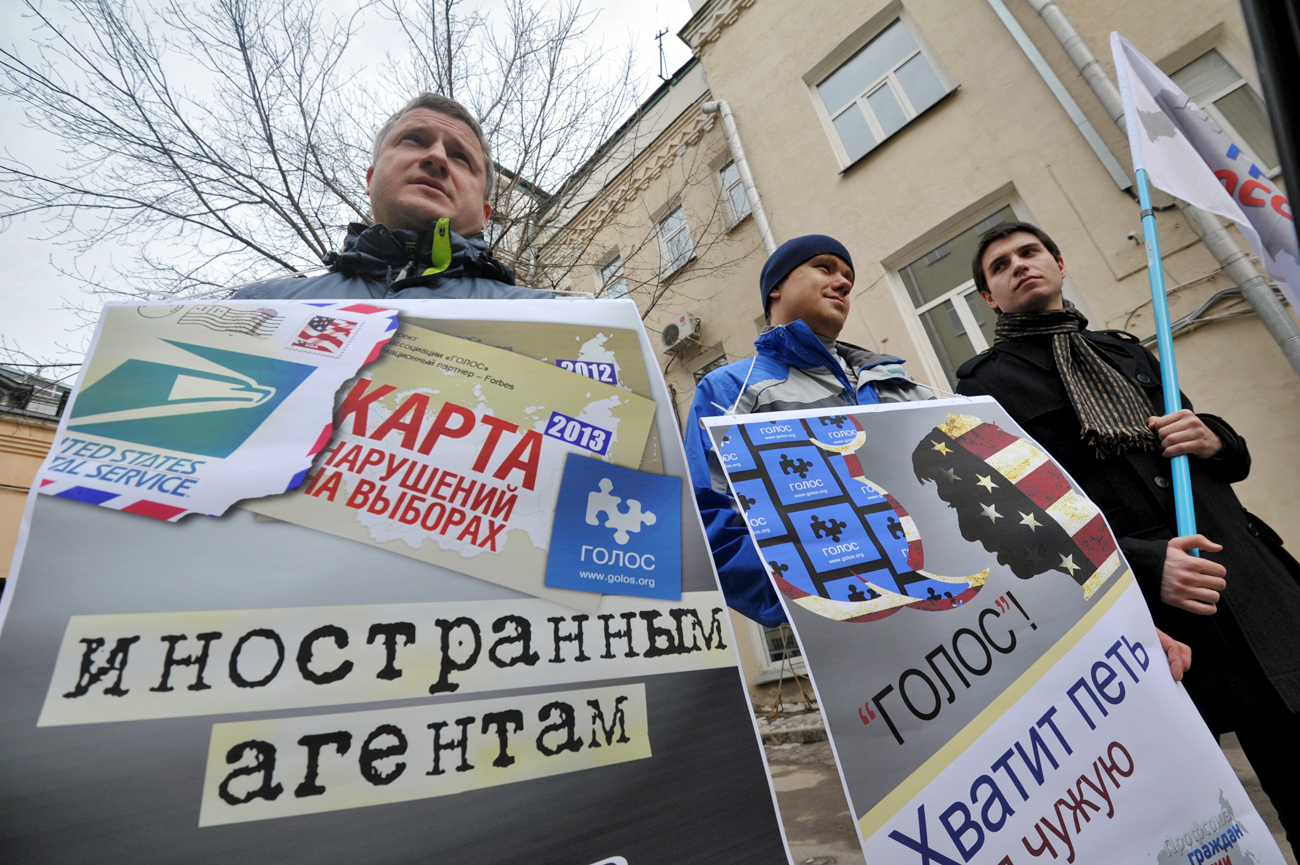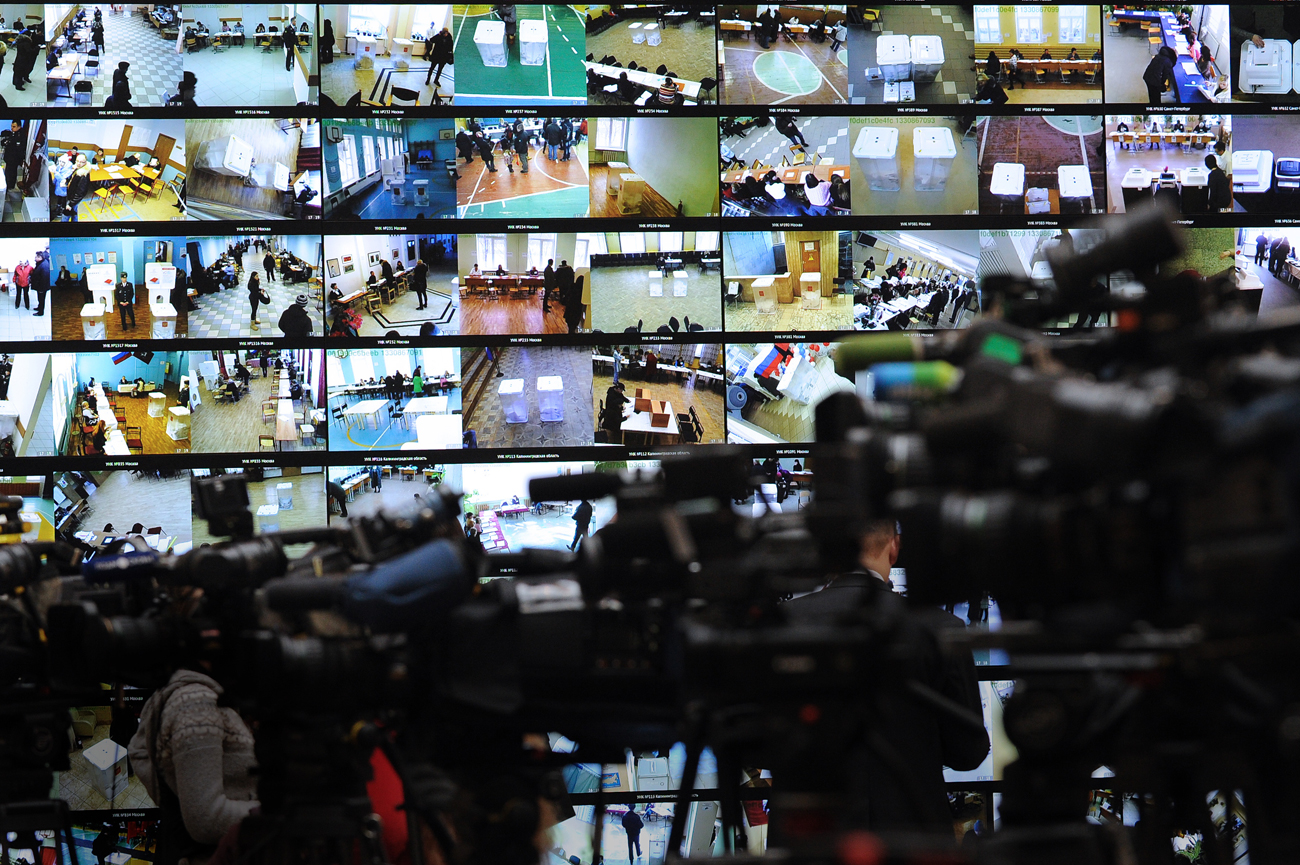
Rally against 'foreign agents' near Golos public association headquarters in 2013.
KommersantJust a month and a half before the State Duma elections, in the middle of the election campaign, the credibility of the electoral process has been dealt a serious blow by the shuttering of a key independent election monitor.
In a landmark event, on July 27 the Presnensky Court of Moscow closed the Golos public association, which protected electors' rights and monitored election violations.
The reason for the decision is that the association has been labeled a "foreign agent," in accordance with a controversial law passed in 2012, since it allegedly carried out political activity under the guise of observation, was financed from abroad and did not conform its charter to legal regulations.
Russian experts have already said that the upcoming Duma elections will be marked by reductions in the possibilities of independent monitoring (and this after the Kremlin had officially announced it would return trust to election results). "Foreign agents" do not have the right to observe elections and will not be admitted to the polling stations.
The association's management publically stated on several occasions that more than half of its budget consists of grants from USAID. However, this was before 2012. Now Golos affirms that it has refused sponsor money from abroad.
"We as a movement now collect voluntary contributions through the internet," the movement's co-chairman Andrei Buzin told the Kommersant newspaper in an article published on July 28.
According to the Russian government, Golos carries out “political activity” since it forms public opinion through its reports and statements (about the current state of the election law and elections as an institution – RBTH).
Golos does not believe that the court's verdict will change anything for it. The organization has been in the register of “foreign agents” since 2014 and it has continuously disputed its assigned status. Despite the label, Golos has so far managed to maintain its objective; the association has simply been reborn in a new form with the same name and become not an association but the Golos public movement, without a juridical basis.
Adapting to the new reality, Golos sent its observers as journalists: It gave volunteers IDs from the press publications that it cooperated with. But legislators have now closed this loophole too.
 Webcams at polling stations monitor the voting process online. Photo from 'Vybory 2012' (Elections 2012) Information Center. Source: TASS / Valery Sharifulin
Webcams at polling stations monitor the voting process online. Photo from 'Vybory 2012' (Elections 2012) Information Center. Source: TASS / Valery Sharifulin
In 2016 the rules for monitoring elections changed. While before a journalist could come to the polling station just with their press ID, now they are obliged to be accredited. And the collaborator has to be a full-time staff member of a registered mass media publication, having worked there for at least two months before the beginning of the elections.
The number of observers from parties has also been reduced. Now only two people can be assigned to each polling station. However, they can now be removed from the station only by a court.
"The position of Russian observers will be much more difficult," said Boris Makarenko, chairman of the Center for Political Technologies. "They will be subjected to stricter control. Something that cannot be said about international observers."
The government has really opened its arms to foreign observers in this election. Russia has invited the authoritative OSCE Office for Democratic Institutions and Human Rights, a neutral organization that has no allegiance to the Russian government.
"During the last elections Russia was formally happy to see these observers but in reality made requirements that were inacceptable for real international observation," explained Makarenko.
The main bone of contention was the fact that the observers were allowed to observe the stations on election day but were not allowed to carry out long-term pre-election monitoring, which Makarenko pointed out makes observation of polling stations meaningless. "The fact that now we have agreed to have the observers present on regular terms is a good sign," he said.
According to Ella Pamfilova, head of the Central Election Committee, "there is no need to put strict conditions before the OSCE" now. Furthermore, Russia will send its representatives to the upcoming U.S. elections in return. "We are completely open and invite everyone. We want them to come," she told RBTH.
Besides the OSCE, there will be observers from the CIS, the Shanghai Cooperation Organization (SCO), the Collective Security Treaty Organization (CSTO) parliamentary assemblies and so on. Only observers from the Parliamentary Assembly of the Council of Europe (PACE) will not be present. They were not invited intentionally because the assembly divested the Russian delegation of authority, including the right of vote, following Russia’s seizure of Crimea and support for rebels in eastern Ukraine in 2014.
All rights reserved by Rossiyskaya Gazeta.
Subscribe
to our newsletter!
Get the week's best stories straight to your inbox